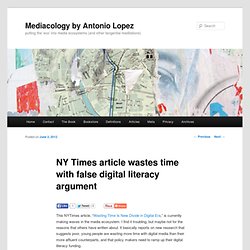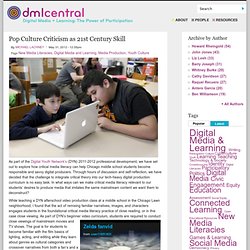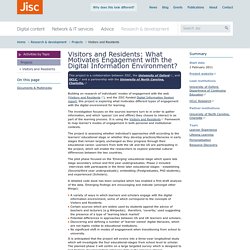

Kennedy.doc. NY Times article wastes time with false digital literacy argument. This NYTimes article, “Wasting Time Is New Divide in Digital Era,” is currently making waves in the media ecosystem.

I find it troubling, but maybe not for the reasons that others have written about. It basically reports on new research that suggests poor, young people are wasting more time with digital media than their more affluent counterparts, and that policy makers need to ramp up their digital literacy funding. I’m bothered by the metaphor of “time-wasting” being used without qualification–it’s a metaphor about how the net is used that has some implicit biases–even class bias. Whereas the educated and affluent don’t waste time, poor people do. Pop Culture Criticism as 21st Century Skill. As part of the Digital Youth Network’s (DYN) 2011-2012 professional development, we have set out to explore how critical media literacy can help Chicago middle school students become responsible and savvy digital producers.

Through hours of discussion and self-reflection, we have decided that the challenge to integrate critical theory into our tech-heavy digital production curriculum is no easy task. In what ways can we make critical media literacy relevant to our students’ desires to produce media that imitates the same mainstream content we want them to deconstruct? While teaching a DYN afterschool video production class at a middle school in the Chicago Lawn neighborhood, I found that the act of remixing familiar narratives, images, and characters engages students in the foundational critical media literacy practice of close reading, or in this case close viewing.
At first glance, the student’s narrative remixing may appear simplistic. Digital Natives, Digital Immigrants. Oro.open.ac. Visitors and Residents: What Motivates Engagement with the Digital Information Environment? Building on research of individuals’ modes of engagement with the web (Visitors and Residents4), and the JISC-funded Digital Information Seeker report5, this project is exploring what motivates different types of engagement with the digital environment for learning.

The investigation focuses on the sources learners turn to in order to gather information, and which ‘spaces’ (on and offline) they choose to interact in as part of the learning process. It is using the Visitors and Residents6 framework to map learner’s modes of engagement in both personal and institutional contexts. The project is assessing whether individual’s approaches shift according to the learners’ educational stage or whether they develop practices/literacies in early stages that remain largely unchanged as they progress through their educational career.